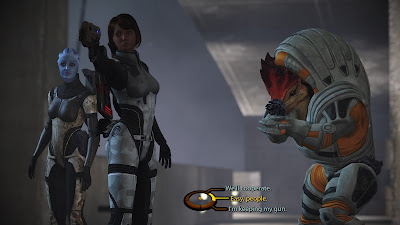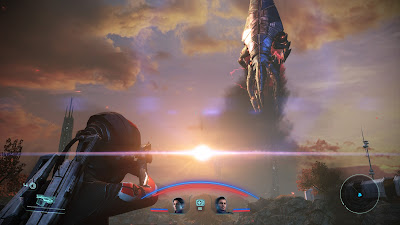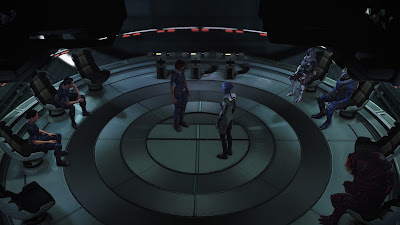Original Release: Nov. 20, 2007 for XBox 360. Version Reviewed: PS4 Legendary Edition, 2021.
THE PLOT:
In the late 22nd century, humanity has become part of an inter-species galactic civilization. All these species are joined together by a series of mass relays, left behind by the long-dead Prothean civilization, which enable faster-than-light travel between star systems. Order is maintained by the Council, a ruling body that operates out of the Citadel, a vast space station that acts as the galactic capital. Thus far, the Council has refused to allow the humans a voice in the larger government, and resentment is starting to brew.
The council has decided that it is time to recruit a human as a SPECTRE - the Council's elite enforcement agents, answerable only to them. The selected candidate is Commander Shepard, First Officer of the Normandy, an advanced vessel that combines elements of human and Turian design. Shepard's evaluation coincides with a mission to recover a beacon, a Prothean artifact, that has been found on the human colony of Eden Prime. No trouble is expected.
But the Normandy arrives to find Eden Prime under attack by the geth, a race of intelligent synthetic beings. The geth are led by Saren - the Council's top SPECTRE. Shepard manages to stop them from taking the beacon, but is exposed to it in the process, granted an apocalyptic vision.
Now Shepard must convince the Council of Saren's guilt and track the rogue SPECTRE across the Mass Relay network. The clock is ticking. If Saren isn't stopped, it will mean the end of galactic civilization...
 |
| The crew of the Normandy encounter some local resistance. |
CHARACTERS:
Commander Shepard: The game gives the player a lot of freedom regarding Shepard. It's a Bioware standard that the character can be either male or female. Beyond that, Shepard has three potential origin stories and three different career backgrounds, both of which will affect dialogue choices and a couple of side missions. There are a mix of dialogue options that can shape Shepard's personality, from compassionate to ruthless, from idealistic to cynical, from diplomatic to combative. I opted for a balanced mix of responses; there are more than enough opportunities to earn "Paragon" (Light Side) or "Renegade" (Dark Side) points, so players should feel free to just decide who their Shepard is and respond accordingly. Even the most "Paragon" of players should hang up on the Council at least once during the playthrough, because: (a) It's funny; and (b) They really have it coming.
Saren: The game's primary antagonist, a rogue SPECTRE who despises humans, whom he feels have been given too much power too quickly. Saren is far from alone in that feeling, and in this first game there is a sense that humans are very much an underdog among the various races (something that, if memory serves, would be lost in later games). Saren initially appears to be a mustache-twirling "Evil for the Sake of Evil" baddie. He gains some depth in the late game, however, as more information about his motives and his state of mind become clear. Voice actor Frederick Tatasciore is terrific in the role, threatening and formidable without being one-note.
Liara T'Soni: One of the most purely innocent members of your party, she is also the daughter of the Asari matriarch who acts as Saren's right hand. She is estranged from her mother, insisting that she knows nothing of her actions. She is also an expert on the extinct Prothean civilization. The character is a bit too naive and earnest in this first installment, though she still gets some good moments, particularly if you bring her along to confront her mother.
Garrus Vakarian: A former member of C-Sec, which is basically the police force on the Citadel. Garrus grew impatient with the layers of bureaucracy that he had to deal with, which he felt interfered with him actually stopping criminals. He is one of the game's better characters, and players get the opportunity to nudge his outlook in one direction or another depending on dialogue choices. The scene in which he (likely) joins the crew also is the single best character introduction in the game.
Wrex: Most of the rest of the characters in Mass Effect improve in later entries (even Garrus); Wrex arrives fully formed. He is a Krogan, a warrior-like race that rose up against the Council generations ago - an uprising that ended when the Council afflicted them with the genophage, a genetically designed plague that caused near sterility. Wrex is understandably bitter, but he is also angry at his own people for refusing to adapt to their circumstances. In one of the first conversations you have with Wrex, he reveals that he "gave up on (the Krogan) a long time ago."
Tali: A Quarian, a race that lost its home to the Geth hundreds of years ago - and that has found little sympathy among Council races, because the Quarians are the ones who created the Geth. They now live among a vast fleet of aging ships. Young Quarians are sent out on pilgrimages when they come of age, returning with something of value to prove their worth to the fleet. Tali, the daughter of a fleet admiral, is determined to prove herself by returning with something of genuine worth - and it's that quest which leads her into Saren's sights.
Kaidan/Ashley: The final two members of the crew are humans - and following a long sci-fi tradition, the humans are by far the dullest characters. Kaidan has an interesting backstory, as his biotic abilities led to a life of harsh training that made him a test subject in all but name. This should make him interesting... but all conversations just amount to him narrating his past, none of which has much impact on the present.
Ashley is even worse. She is from a career military family, though one that has been discriminated against in the ranks ever since her grandfather surrendered to an enemy rather than allow civilians to die. She harbors resentment against aliens as a result, leading many in fandom to dismiss her a "space racist." Oh, and she quotes Tennyson. A lot. Too much. Both voice actors (Raphael Sbarge, Kimberly Brooks) do a fine job, but I couldn't make myself care even a little bit about either of them.
 |
| Combat is satisfying and intuitive - and greatly improved in the Legendary Edition. |
COMBAT:
Mass Effect may be the earliest Bioware game to have reasonably satisfying combat. Even in its original version, it was an engaging cover shooter. It's easy to enter in and out of cover, and aiming and firing are entirely intuitive. There are several types of weapons available, from assault rifles to shotguns to sniper rifles, and it's easy to switch between guns by bringing up the weapons wheel with a click of the left bumper.
The right bumper also brings up squad members' biotic abilities, allowing you to lift, throw, or otherwise afflict enemies even as you're shooting them. Attacks can be combined to devastating effect; Liara's Singularity ability, once fully upgraded, is a gamechanger, with her able to send giant Geth Colossi floating around helplessly for you to use as target practice.
The Legendary Edition improves on the original combat. Aiming is noticeably more stable. The sniper rifles - which were so juddery as to be practically useless in the original version - are now arguably too effective; using sniper rifles basically amounts to playing on Easy Mode, even with the difficulty on maximum.
 |
| A battlefield conversation with Saren: Dialogue options can shape characters and, occasionally, mission results. |
ADDITIONAL GAMEPLAY:
This is a Bioware RPG, which means that combat is less than half of the total gameplay. Players will spend a lot of time shooting and zapping various enemies, but they will spend even more simply exploring and learning about this fictional universe, discovering various NPCs and side quests along the way.
Mass Effect's main plot is quite linear, but a lot of flexibility has been built into the individual quests. You can save individuals, or you can choose to sacrifice them. In the case of one side quest, involving a woman tangled up in organized crime, you can talk her into severing those ties, fight her, or demand your own piece of the action. A main quest that involves gaining access to a research laboratory has at least three different paths to follow; all of them will get you to the same destination, but the journey will be just a little different depending on what you do.
 |
| Your first in-person look at a Reaper - not that Shepard even knows what that is yet... |
AN ADMISSION OF BIAS:
The original Mass Effect holds a special place for me. I first played it in 2012. Before then, I regarded video games as a lesser art form. Even when I enjoyed a specific game (such as the first two Fallouts way back in the 1990s), no title had ever drawn me into its world in the same way that good books, movies, or television programs had done.
Then I played Mass Effect, and I was stunned by the quality voice acting, the solid plot and characters, and the detailed and internally consistent universe. I was gripped and even emotionally engaged. By modern standards, it's not a long game - about 40 hours, including DLC, and that's if you complete all the side quests along the way. But at the time, to a relative non-gamer, it felt as enormous as it was immersive.
The Mass Effect games led me to Dragon Age... and then to Knights of the Old Republic... and then to the Fire Emblem and Persona franchises... and somewhere along the way, I had to acknowledge: (a) that I had become a gamer, rather than someone who occasionally noodled at a video game; and (b) that my previous dismissal of an entire medium had been, to put it mildly, a bit premature.
 |
| Driving the Mako through an alien warzone. |
OTHER MUSINGS:
Even accounting for the special place this game holds for me, I'd still say that it holds up well overall. The main plot is well-paced. If you play the story missions in the order that the story pushes you toward, there is a distinct sense of rising stakes as you move from combating Saren's drones and hired muscle, to battling a trusted lieutenant, to finally coming face-to-face with the villain himself.
To the game's credit, it has alternate scenes and dialogue options for those who choose a different sequence (the alternate "finding Liara" scene is quite entertaining), but the default mission order is also the most dramatically satisfying one.
There are a wealth of side quests, and some of these mini-stories help to flesh out the universe. The actual gameplay structure gets a bit repetitive, though. You land on either a planet or a spaceship. If you're on a planet, you drive to three points to scan objects before going to the main destination - a prefabricated station that always has the same layout, and whose enemies usually follow the same attack pattern. If on a spaceship, then you go through the same entry hall before fighting enemies in the main corridor, and then you find the plot point in the cockpit. Even when the side quest's story is interesting, the structure is uninspired - particularly compared to the varied and richly detailed main story missions.
The Legendary Edition is a substantial improvement over the 2007 original - I didn't realize just how much of one until I fired up my old XBox 360 version to replay the "Pinnacle Station" DLC (which is not included in the remaster). In addition to combat improvements, the visuals have received a significant overhaul. Characters and environments are much more detailed, and cutscenes look more cinematic.
The additional detail is particularly evident during planetary explorations. You can now tell which surfaces can and can't be driven on, which makes driving the Mako less aggravating than it used to be. I suspect enhancements will be less noticeable in later games, given that Mass Effect 2 and 3 still look pretty good by modern standards, but the difference in the original is practically night-and-day.
 |
| Shepard and the Normandy crew discuss their options. |
OVERALL:
Mass Effect was the last of the three original IPs that Bioware released when it decided to move away from established franchises, following Jade Empire and Dragon Age: Origins. Along with Dragon Age, the Mass Effect series has become the property the company's most associated with.
It's also a rather good game. Even in the Legendary Edition, there are aspects of the 2007 original that show its age - notably the repetitive side quests. The main story remains solid, however, and the main story missions are varied and engaging. More than fifteen years after its original release, this fictional universe remains a place well worth spending some time in.
Overall Rating: 8/10.
Mass Effect DLC
Next Game: Mass Effect 2
Review Index
To receive new review updates, follow me:
On BlueSky:
On Threads:



No comments:
Post a Comment